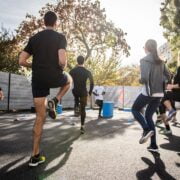
The Power of Movement: Exploring the Incredible Benefits of Physical Activity
Physical activity is an essential component of a healthy lifestyle. It not only helps to maintain a healthy weight but also has numerous benefits for overall health and well-being. Regular exercise has been shown to reduce the risk of chronic diseases such as heart disease, diabetes, and certain types of cancer. It also improves cardiovascular health, strengthens muscles and bones, and enhances mental health.
Exercise has both physical and mental health benefits. Physically, it helps to improve cardiovascular health by strengthening the heart and improving blood circulation. It also helps to maintain a healthy weight by burning calories and increasing metabolism. Regular exercise can also improve sleep quality, boost energy levels, and enhance overall physical fitness.
Mentally, exercise has been shown to reduce symptoms of depression and anxiety. It releases endorphins, which are natural mood boosters, and can help to alleviate stress and improve cognitive function. Exercise has also been linked to improved self-esteem and body image.
Key Takeaways
- Regular exercise improves cardiovascular health and sleep quality.
- Physical activity can alleviate symptoms of depression and anxiety.
- Exercise can aid in weight management and muscle building.
- Stretching improves mobility and prevents injury.
- Staying active can help maintain independence as we age.
The Science Behind Movement: How Exercise Affects Our Bodies and Minds
Exercise affects our bodies and minds on a physiological level. When we engage in physical activity, our heart rate increases, which improves blood flow and oxygen delivery to our muscles. This helps to strengthen the heart muscle and improve cardiovascular health.
Different types of exercise have different effects on the body. Aerobic exercise, such as running or swimming, increases heart rate and breathing rate, which improves cardiovascular fitness. Strength training exercises, such as lifting weights or using resistance bands, help to build muscle strength and increase metabolism. Flexibility exercises, such as stretching or yoga, improve range of motion and prevent injury.
Exercise also affects our minds by releasing endorphins, which are natural mood boosters. Endorphins help to reduce symptoms of depression and anxiety and improve overall mental well-being. Exercise has also been shown to improve cognitive function by increasing blood flow to the brain and promoting the growth of new brain cells.
The Benefits of Regular Exercise: From Improved Cardiovascular Health to Better Sleep
Regular exercise has numerous benefits for overall health and well-being. One of the most significant benefits is improved cardiovascular health. Engaging in regular aerobic exercise, such as brisk walking or cycling, helps to strengthen the heart muscle, lower blood pressure, and improve blood circulation. This reduces the risk of heart disease, stroke, and other cardiovascular conditions.
Exercise also plays a crucial role in improving sleep quality. Regular physical activity helps to regulate sleep patterns and promote deeper, more restful sleep. It can also help to alleviate symptoms of insomnia and improve overall sleep quality.
In addition to cardiovascular health and sleep, regular exercise also increases energy levels. Engaging in physical activity increases blood flow and oxygen delivery to the muscles, which helps to boost energy levels and reduce fatigue. Exercise also stimulates the release of endorphins, which are natural mood boosters that can help to increase energy and improve overall well-being.
Exercise and Mental Health: How Movement Can Help Alleviate Depression and Anxiety
| Exercise and Mental Health: How Movement Can Help Alleviate Depression and Anxiety |
|---|
| Regular exercise can reduce symptoms of depression and anxiety |
| Exercise releases endorphins, which can improve mood and reduce stress |
| Exercise can increase self-esteem and confidence |
| Exercise can improve sleep quality, which can positively impact mental health |
| Exercise can provide a sense of accomplishment and control, which can improve mental well-being |
| Exercise can be a social activity, which can reduce feelings of isolation and loneliness |
| Exercise can be a healthy coping mechanism for stress and difficult emotions |
Exercise has been shown to have a significant impact on mental health. It has been found to be an effective treatment for depression and anxiety, as it helps to reduce symptoms and improve overall well-being.
When we engage in physical activity, our bodies release endorphins, which are natural mood boosters. These endorphins help to reduce symptoms of depression and anxiety and improve overall mental well-being. Exercise also helps to reduce stress by increasing the production of neurotransmitters such as serotonin and dopamine, which are known to improve mood.
Different types of exercise can have different effects on mental health. Aerobic exercise, such as running or swimming, has been found to be particularly effective in reducing symptoms of depression and anxiety. This is because aerobic exercise increases heart rate and breathing rate, which stimulates the release of endorphins and improves overall mood.
Strength training exercises, such as lifting weights or using resistance bands, can also have a positive impact on mental health. Strength training helps to build muscle strength and increase metabolism, which can improve overall physical fitness and boost self-esteem. This can have a positive effect on mental well-being and help to reduce symptoms of depression and anxiety.
The Role of Physical Activity in Weight Management: How Exercise Can Help You Lose Weight and Keep it Off
Exercise plays a crucial role in weight management. It helps to burn calories, increase metabolism, and build lean muscle mass, all of which contribute to weight loss and weight maintenance.
When we engage in physical activity, our bodies burn calories to fuel the movement. This helps to create a calorie deficit, which is necessary for weight loss. Regular exercise also increases metabolism, which is the rate at which our bodies burn calories at rest. This means that even when we are not exercising, our bodies continue to burn calories at a higher rate.
In addition to burning calories, exercise also helps to build lean muscle mass. Muscle is more metabolically active than fat, which means that it burns more calories at rest. This can help to increase metabolism and contribute to weight loss and weight maintenance.
Different types of exercise can have different effects on weight management. Aerobic exercise, such as running or cycling, is particularly effective in burning calories and promoting weight loss. Strength training exercises, such as lifting weights or using resistance bands, help to build lean muscle mass and increase metabolism. Both types of exercise are important for overall weight management.
The Benefits of Strength Training: Building Muscle and Boosting Metabolism
Strength training exercises have numerous benefits for overall health and well-being. One of the most significant benefits is building muscle strength. When we engage in strength training exercises, such as lifting weights or using resistance bands, we put stress on our muscles, which causes them to adapt and become stronger.
Building muscle strength has several benefits. It helps to improve overall physical fitness and performance, as stronger muscles can generate more force and power. It also helps to increase metabolism, as muscle is more metabolically active than fat. This means that the more muscle mass we have, the more calories we burn at rest.
Strength training exercises also help to improve bone density and reduce the risk of osteoporosis. When we engage in weight-bearing exercises, such as lifting weights or doing push-ups, we put stress on our bones, which stimulates them to become stronger and denser. This can help to prevent bone loss and reduce the risk of fractures.
The Importance of Flexibility and Mobility: How Stretching Can Improve Your Movement and Prevent Injury
Flexibility and mobility are essential components of overall health and well-being. They help to improve movement, prevent injury, and enhance physical performance.
When we engage in regular stretching exercises, such as yoga or Pilates, we improve our flexibility and range of motion. This allows us to move more freely and perform daily activities with ease. It also helps to prevent muscle imbalances and reduce the risk of injury.
Stretching exercises also help to improve posture and alignment. When we stretch our muscles, we lengthen them, which helps to improve posture and reduce muscle tension. This can help to alleviate back pain and improve overall body alignment.
In addition to improving movement and preventing injury, stretching exercises also help to promote relaxation and reduce stress. When we engage in stretching exercises, we focus on our breath and body, which helps to calm the mind and promote a sense of relaxation.
Exercise and Aging: How Physical Activity Can Help You Stay Healthy and Independent as You Age
Physical activity is particularly important for aging adults. It helps to maintain independence, improve overall health, and reduce the risk of chronic diseases.
As we age, our bodies naturally lose muscle mass and bone density. This can lead to a decrease in strength and mobility, making it more difficult to perform daily activities. Engaging in regular physical activity, such as walking or swimming, can help to maintain muscle mass and bone density, improve strength and mobility, and reduce the risk of falls and fractures.
Exercise also plays a crucial role in maintaining cognitive function as we age. Regular physical activity has been shown to improve memory, attention, and overall cognitive function. It also helps to reduce the risk of cognitive decline and dementia.
In addition to physical and cognitive health, exercise also has numerous benefits for mental well-being in aging adults. It helps to reduce symptoms of depression and anxiety, improve sleep quality, and enhance overall mood and well-being.
Finding the Motivation to Move: Tips for Staying Active and Overcoming Barriers to Exercise
Finding the motivation to exercise can be challenging, especially when faced with barriers such as lack of time, energy, or motivation. However, there are several strategies that can help to overcome these barriers and stay active.
One of the most effective ways to stay motivated is to set realistic goals. Start by setting small, achievable goals that are specific, measurable, attainable, relevant, and time-bound (SMART). This will help to keep you focused and motivated as you work towards your goals.
Another strategy is to find activities that you enjoy. If you enjoy the activity, you are more likely to stick with it. Try different types of exercise until you find something that you enjoy, whether it’s dancing, swimming, or playing a sport.
It’s also important to make exercise a priority in your daily life. Schedule it into your calendar like any other appointment and treat it as non-negotiable. This will help to ensure that you make time for physical activity.
Finally, find ways to incorporate physical activity into your daily routine. Take the stairs instead of the elevator, walk or bike to work instead of driving, or take a walk during your lunch break. These small changes can add up and make a big difference in your overall activity level.
The Power of Movement for a Healthier, Happier Life.
In conclusion, physical activity is essential for overall health and well-being. It has numerous benefits for both physical and mental health, including improved cardiovascular health, better sleep, increased energy levels, and reduced symptoms of depression and anxiety.
Different types of exercise have different effects on the body and mind. Aerobic exercise improves cardiovascular fitness, strength training builds muscle strength and boosts metabolism, flexibility exercises improve movement and prevent injury, and stretching exercises promote relaxation and reduce stress.
Exercise also plays a crucial role in weight management, as it helps to burn calories, increase metabolism, and build lean muscle mass. It is particularly important for aging adults, as it helps to maintain independence, improve cognitive function, and reduce the risk of chronic diseases.
Finding the motivation to exercise can be challenging, but there are several strategies that can help. Setting realistic goals, finding activities that you enjoy, making exercise a priority, and incorporating physical activity into your daily routine can all help to stay active and reap the benefits of regular exercise.
Incorporating physical activity into your daily life is one of the best things you can do for your health and well-being. So get moving and start reaping the benefits of regular exercise today!
If you’re interested in learning more about the benefits of physical activity, you might find this article from Wave Magnets intriguing. They discuss how physical activity can improve mental health and well-being, boost energy levels, and enhance cognitive function. Check out their article here to discover more about the positive impact of staying active on your overall health.
FAQs
What is physical activity?
Physical activity refers to any bodily movement that requires energy expenditure. It can be as simple as walking or as intense as running a marathon.
What are the benefits of physical activity?
Physical activity has numerous benefits, including improving cardiovascular health, reducing the risk of chronic diseases such as diabetes and obesity, improving mental health, and increasing overall physical fitness.
How much physical activity should I do?
The World Health Organization recommends that adults engage in at least 150 minutes of moderate-intensity aerobic physical activity or 75 minutes of vigorous-intensity aerobic physical activity per week.
What are some examples of physical activity?
Examples of physical activity include walking, running, cycling, swimming, dancing, strength training, and sports such as basketball, soccer, and tennis.
Can physical activity help with weight loss?
Yes, physical activity can help with weight loss by burning calories and increasing metabolism. However, it is important to combine physical activity with a healthy diet for optimal weight loss results.
Can physical activity improve mental health?
Yes, physical activity has been shown to improve mental health by reducing symptoms of depression and anxiety, improving mood, and increasing self-esteem.


















